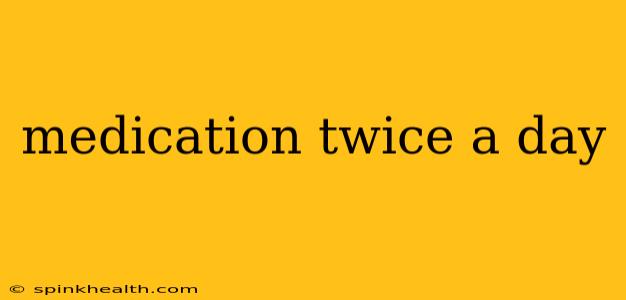The Twice-Daily Medication Routine: A Guide to Success
Taking medication twice a day can feel like a small detail, a simple instruction. But for many, this seemingly minor task can become a significant hurdle in managing their health. This isn't just about remembering pills; it's about building a consistent, reliable routine that contributes to overall well-being. This guide delves into the practicalities and psychological aspects of twice-daily medication, offering strategies to make it easier and more effective.
Imagine this: Sarah, a vibrant 45-year-old, was recently diagnosed with a condition requiring twice-daily medication. At first, she felt confident. "Twice a day? Piece of cake!" she thought. But as the weeks passed, the routine became a battle. She'd miss doses, sometimes forgetting entirely, other times remembering only after hours had gone by. This wasn't just inconvenient; it directly impacted her health. This story is far from unique. Many individuals struggle with medication adherence, particularly when multiple doses are required.
This article will explore the challenges of twice-daily medication, providing practical tips and addressing frequently asked questions to help you navigate this aspect of your healthcare journey.
Why is it so hard to remember medication twice a day?
Life gets busy. Between work, family, social commitments, and everything else, it's easy for even the most important tasks to slip our minds. Twice-daily medication requires mindful planning and consistent effort. This is especially true if you are managing multiple medications or other health concerns. Our brains are not designed to perfectly track every single task, and forgetting a dose isn't necessarily a sign of forgetfulness or carelessness.
What are some tips and tricks for remembering medication twice a day?
This is where strategy comes into play. There are several ways to improve adherence:
-
Set Reminders: Leverage technology! Use phone alarms, smartwatches, or medication reminder apps. Set two distinct alarms, one for morning and one for evening. Consider setting a secondary reminder 15 minutes before the actual time, acting as a pre-emptive nudge.
-
Visual Cues: Place your medication in a visible spot – on the bathroom counter, bedside table, or kitchen counter. A brightly colored pill container can serve as a visual reminder.
-
Link to Existing Habits: Tie your medication intake to existing routines. For instance, take your morning dose with your coffee or breakfast and your evening dose before brushing your teeth. This anchors the task to a pre-established habit, making it easier to remember.
-
Medication Organizer: Pill organizers, whether weekly or daily, are excellent for visual organization and dose tracking. They allow you to pre-portion your medication, removing the daily hassle of counting pills.
-
Buddy System: Enlist a friend, family member, or partner to help you remember. They can act as an accountability partner, gently reminding you if you happen to forget.
-
Charting your doses: Keeping a simple chart to mark each time you've taken your medication can build a sense of accomplishment and make it easier to identify patterns or areas for improvement.
What if I miss a dose?
Don't panic! Your reaction to a missed dose will depend on the medication itself. Always consult your doctor or pharmacist. They can provide specific guidance for your particular medication and condition. Never attempt to double up on doses without professional medical advice, as this can have unintended consequences.
Are there any long-term effects of inconsistent medication adherence?
Inconsistent medication adherence can significantly compromise the effectiveness of your treatment. Depending on the condition and medication, this could lead to various negative health outcomes, including worsening symptoms, increased risk of complications, and even hospitalization. Consistency is key.
How can I make taking medication twice a day easier?
Remember, managing your health involves more than just taking pills. Prioritizing self-care, stress management, and sufficient sleep can all impact your ability to stay on track.
In Sarah’s case, after implementing these strategies, her routine became smoother. By combining technology, visual cues, and a supportive network, she regained control of her medication schedule, improving her health and overall quality of life. Consistent medication adherence is achievable with the right approach. Remember, your health journey is personal, and finding the right strategies for managing your twice-daily medication can significantly impact your well-being. Don't hesitate to reach out to your healthcare provider for support and guidance.

